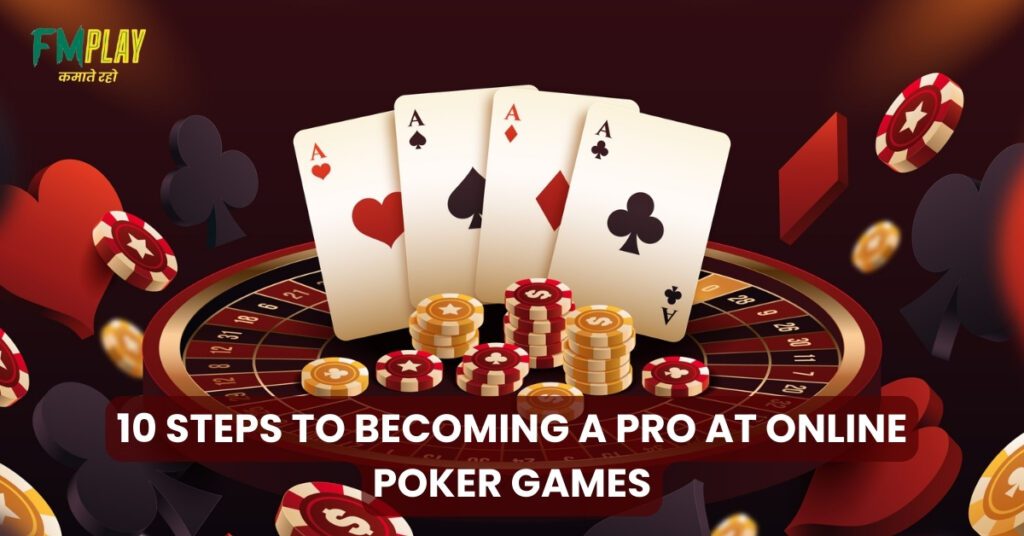Online poker has taken the world by storm, offering players the chance to enjoy the thrill of the game from the comfort of their homes. But how do you transition from a casual player to a poker pro? This comprehensive guide will walk you through 10 essential steps to master online poker games. Whether you’re a beginner or an intermediate player, these tips will help you hone your skills and increase your chances of winning.
Step 1: Understand the Basics of Online Poker Games
Learn the Rules and Variants
Before diving into online poker games, it’s crucial to understand the basic rules and the different variants of the game, such as Texas Hold’em, Omaha, and Seven-Card Stud. Each variant has its own set of rules and strategies, so familiarize yourself with the one you intend to play the most.
Study the Poker Hand Rankings
Knowing the hand rankings is fundamental to poker. Learn the hierarchy from a Royal Flush to a High Card to make informed decisions during game play.
Step 2: Choose the Right Online Poker Platform
Research Reputable Poker Sites
Select a reliable and secure online poker games site. Look for platforms that offer good bonuses, have a large player base, and are known for their fair play policies.
Check for Licensing and Regulation
Ensure the site is licensed and regulated by a reputable authority. This guarantees the site’s credibility and protects you from fraud.
Step 3: Start with Low Stakes Games
Practice with Lower Stakes
Begin your journey with low-stakes games to minimize your risk while learning the ropes. This approach helps you gain experience without losing significant amounts of money.
Focus on Learning, Not Winning
At the initial stage, prioritize learning and improving your skills over winning. This mindset will pay off in the long run.
Step 4: Develop a Solid Strategy
Master the Art of Bluffing
Bluffing is a key element of poker. Learn when and how to bluff effectively to keep your opponents guessing.
Understand Position Play
Your position at the table can significantly impact your strategy. Learn how to use your position to your advantage.
Step 5: Manage Your Bankroll Wisely
Set a Budget
Decide on a budget for your poker activities and stick to it. Avoid chasing losses and understand when to walk away.
Keep Track of Your Wins and Losses
Maintain a record of your games to analyze your performance and identify areas for improvement.
Step 6: Study Your Opponents
Observe Playing Patterns
Pay attention to how your opponents play. Identify their strengths, weaknesses, and tendencies to devise strategies against them.
Use Poker Tracking Software
Utilize poker tracking software to gather data on your opponents. This tool can provide insights into their playing style and habits.
Step 7: Continuously Improve Your Skills
Read Books and Articles
Invest time in reading poker books and articles written by experienced players. Learning from the pros can provide valuable insights and advanced strategies.
Watch Professional Poker Games
Watching professional poker games can help you understand how top players think and act in various situations.
Step 8: Join a Poker Community
Participate in Online Forums
Engage with other online poker games enthusiasts in online forums. Discuss strategies, share experiences, and learn from each other.
Attend Poker Workshops and Seminars
Participate in workshops and seminars to learn from experts and meet like-minded individuals.
Step 9: Play Regularly
Practice Makes Perfect
Regular play is essential to improving your skills. The more you play, the better you’ll understand the nuances of the game.
Analyze Your Games
After each session, review your hands and decisions. Analyze what you did right and where you can improve.
Step 10: Stay Disciplined and Patient
Keep Your Emotions in Check
Online poker games can be an emotional game. Stay disciplined, keep your emotions in check, and avoid tilt (playing poorly due to frustration).
Be Patient
Becoming a online poker pro doesn’t happen overnight. Be patient with your progress and stay committed to improving.
FAQs
Q1: How long does it take to become a professional online poker player?
A: The time it takes varies for each individual. It depends on your dedication, practice, and ability to learn from your experiences.
Q2: Can you make a living playing online poker?
A: Yes, many players make a living from online poker. However, it requires a high level of skill, discipline, and bankroll management.
Q3: What is the best online poker site for beginners?
A: Some popular and beginner-friendly sites include PokerStars, 888poker, and PartyPoker. These platforms offer good tutorials, bonuses, and low-stakes games.
Q4: Is online poker rigged?
A: Reputable and licensed online poker sites are not rigged. They use random number generators (RNGs) to ensure fair play.
Conclusion
Becoming a pro at online poker games is a journey that requires dedication, continuous learning, and practice. By following these 10 steps, you can improve your skills, develop effective strategies, and increase your chances of success. Remember, the key to becoming a poker pro lies in staying disciplined, patient, and always striving to learn more.
By adhering to these guidelines and continuously honing your skills, you’ll be well on your way to mastering online poker games and possibly turning your passion into a profitable endeavor. Happy playing!


